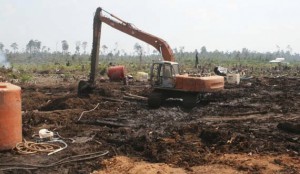The Kampar peninsula in Riau, Sumatra has become a center of expansion of the pulp and paper industry. Once entirely peat forest and peat swamp habitats, the most carbon rich forests in the world, the Kampar is being rapidly converted to Acacia tree plantations.
This month, Asia Pacific Resources International Holdings Limited (APRIL), one of the world’s largest paper producers, has been reeling from negative pressures on two fronts.
The Indonesian environmental NGO Eyes on the Forest (EoF) has released an investigative report questioning the legality of APRIL’s clearing of the Kerumutan peat swamps.
In their report, available HERE, EoF establishes that an APRIL subsidiary, PT Sumatera Riang Lestari, is currently clearing forest that is designated ‘Hutan Lindung’ or protected forest, in direct violation of Indonesia’s forestry laws. Additionally, the Kerumutan is peat over 3 meters deep, which is also strictly protected by Indonesian law.

The Kerumutan meets all criteria of High Conservation Forest, as defined by the Forest Stewardship Council, and is a key habitat for the endangered Sumatran Tiger. Over the past 6 months, four tigers have been killed and 4 men have been injured in two separate incidents of human-tiger conflict just outside of PT Sumatera Riang Lestari’s operating area.
EoF calls on APRIL to abide by Indonesian law and immediately stop forest clearing in Kerumutan.
Across the Kampar peninsula, the community of Teluk Meranti is struggling protect their traditional forest lands from APRIL. In a letter issued in June, Teluk Meranti rejects the presence of Riau Andalan Pulp and Paper (RAPP), another APRIL subsidiary in the Kampar:
—————
TELUK MERANTI COMMUNITY LETTER OF REJECTION TOWARDS RAPP COMPANY (APRIL)
Teluk Meranti, 20 June 2009
Regarding:
UPHOLDING TELUK MERANTI COMMUNITY RIGHTS
To the Honourable,
President Director of RAPP company (APRIL)
With this, the community of Teluk Meranti subdistrict, based on our needs to the land located across the river or land intended to become a part of your company’s operational area, declares that it: REJECTS THE PRESENCE OF THE RAPP COMPANY.
This is done with regard to the below considerations:
- The land is to be retained for our grandchildren’s future
- Experiences by other surrounding villages or areas where RAPP company has operated which have impacted negatively on the local community’s rights
- It has caused loss of agricultural and horticultural land belonging to the community
- The community will lose the source of its livelihood (economic, social and cultural) from the forest which will be converted to an industrial timber plantation
We, the community of Teluk Meranti, have inhabited and utilised this area in a wise and traditional way far preceeding Indonesia’s independence.
Thus concludes this rejection letter, made with great consideration so that unwanted problems will be avoided in the future.
Respectfully yours,
The community of Teluk Meranti
—————–
August 17th the Forest Peoples Program issued a letter to the Director of RAPP encouraging RAPP and APRIL to respect Teluk Meranti’s right to self-determination and the internationally recognized Free, Prior, and Informed, and Consent (FPIC) standard. The letter has gained 27 Indonesian and international signatories
Interestingly the letter points out that the then Director of RAPP confirmed his company’s commitment to the FPIC standard when establishing new plantations. In the coming months RAN will be following RAPP’ response closely to see if they live up to their own commitments and respect Teluk Meranti’s desire, in their own words, to see that their land is “retained for their grandchildren’s future.”
David Gilbert is a Research Fellow at RAN. He has worked in the tropical forests of the Amazon and Indonesia, with a special focus on forest conservation and indigenous rights.